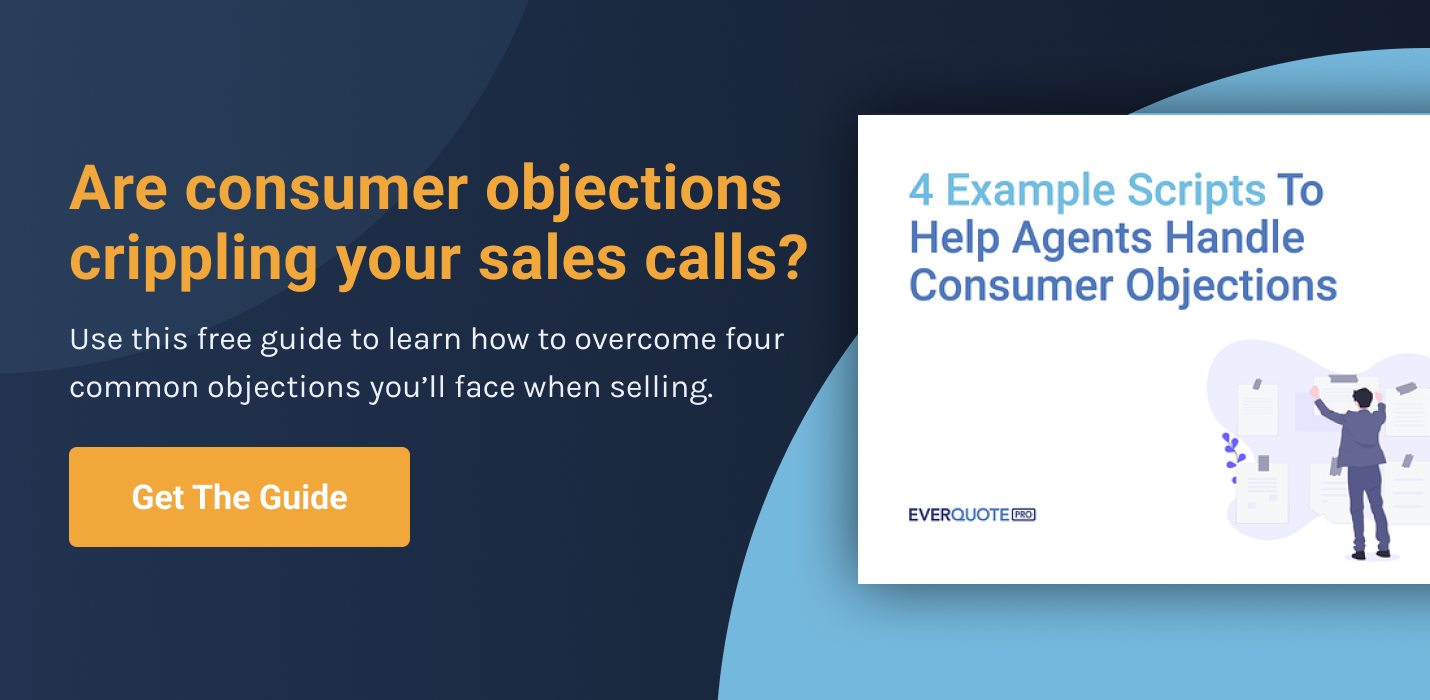- Home»
- EverQuote Pro Blog»
- How To Sell Insurance When Your Carrier's Rates Are High
How To Sell Insurance When Your Carrier's Rates Are High

One of the most common complaints we hear from agents is that their carriers’ high rates are negatively impacting their insurance sales. And while that may (in some cases) be a true statement, a successful insurance agent will never use it as an excuse to give up—they’ll instead find a way to either use it to their advantage or work around it.
Curious how they do it? (And how you can do it, too?) In this article, we’ll provide some context you can use to understand high carrier rates and how to frame them to your prospects, as well as unpack a few insurance sales tips for working around it.
Tip 1: Understand Why Carrier Rates May Be HighMost carriers don’t want to be known as the most expensive option in the marketplace, so if they are, there’s likely a driver behind that which will eventually impact the entire industry. If you’re a captive agent faced with this scenario, it’s crucial that you provide your clients proper context and explain what’s going on with the larger industry picture. For example, back in 2016 after a year of heavy payouts and combined loss ratios of over 100% for many carriers, one national carrier escalated rates—with automobile insurance rate increases totaling $1.1 billion—in order to continue making a profit as they dealt with increasing losses across the board. And while it seemed this particular carrier was the exception, in reality, all the carriers eventually had to raise their rates; this company just happened to be the first to do it. Their increase was shocking compared to rates from other carriers—until those other carriers began to “catch up” with increases of their own. |
Tip 2: Price isn’t the only driving factor for all customers.
The cost of insurance is the primary driver for customers about half of the time, so it is important. But it’s not the only factor they’re considering. Here’s what you can do to make sure your insurance sales strategies focus on the other 50% of what many consumers are thinking:
- Explain why your rates are increasing. When you explain the “rules of the game” to the customer—that most carriers will be matching your carrier’s seemingly high rates soon—you’ve opened a door of opportunity to explain the value your carrier provides. While not everyone will be receptive your explanation, statistically, about half of your prospects will be. These potential customers seem to respond to insurance agents who take time to share the context because it helps make sense of the situation.
What do you say when an insurance lead objects to your sales call Instead of panicking, try the four sample scripts outlined in this guide.
- Become a resource for your consumer. By taking the time to educate, you forge a deeper level of connection with the consumer. You’re the bridge between them and the industry, and by helping them understand the rationale behind the pricing fluctuations, you identify yourself as their “helper.” There are no circumstances where people like to pay more, but by explaining what’s actually going on you can help them see the value they’ll get from your product.
- Speaking of value, know your value proposition. In the absence of value, any price is too expensive for insurance, so agents who don’t have a single value proposition won’t bind any policies. Take time to understand your differentiators, and then explain those key differences to your prospects.
- Provide a world-class experience. As I mentioned earlier, people aren’t buying your insurance products only for the price, but also for the experience your agency provides. If you can provide a better experience for them there are a lot of things you can do to become a personal advocate for them. Check out 12 Customer Retention Strategies In The Insurance Industry to learn a dozen best practices for retaining customers that are easy to implement.
- Don’t be an order-taker. If price is the only thing a prospect is considering, consider whether or not you’re the right agent for them. Agents who focus only on this aspect become order-takers, not value providers.
Tip 3: Use Knowledge To Overcome Objections
Most consumers don’t understand insurance, so in the absence of knowledge, they can only compare price. (Tweet This!) They need you to educate them in the ways that interest them. No longer are agents able to gain the upper hand by meeting prospects at their kitchen tables or strictly over the phone, so you have to find other ways to get and hold their attention. Fortunately, technology makes this possible. Agents who work hard and really get to know their customers can create a better experience to explain how price fits into the mechanics of their coverage; as a result, they have more prospects who are willing to buy.
Tip 4: Use Your Resources
Finding the right customer base is the critical first step in your insurance sales strategy, but doing it alone can be difficult. That’s where we come in. At EverQuote, we offer 100% organically generated leads—people who come to our website who are already looking for insurance products—and then we provide that lead information to agents like you – in real time as the consumer is shopping online. It works for thousands of agents (including top agents like Perry Olson), and it could be what helps your agency reach that next level of success. You can find out more about our process here.
Unlock predictable growth with EverQuote.
Our representatives are standing by to help you succeed.
Call 844-707-8800
Weekdays, 9AM-5PM (ET)
Call 844-707-8800
Weekdays, 9AM-5PM (ET)
Accelerate your growth.
Complete the form below or just call 844-707-8800 to learn how we can help you achieve your goals.
By clicking "Get Started", I consent by electronic signature to being contacted by EverQuote, including by automatic telephone dialing and/or an artificial or prerecorded voice (including SMS and MMS - charges may apply), regarding EverQuote for Agents, even if my phone number is listed on a Do Not Call Registry. I also understand that my agreement to be contacted is not a condition of purchasing any goods or services, and that I may call (844) 707-8800 to speak with someone about EverQuote for Agents.
By clicking "Get Started", I affirm that I have read and agree to this website’s Privacy Policy and Terms of Use, including the arbitration provision and the E-SIGN Consent.
* Mandatory fields
 Product Overview
Product Overview Blog
Blog FAQs
FAQs Webinars
Webinars eBooks & Resources
eBooks & Resources